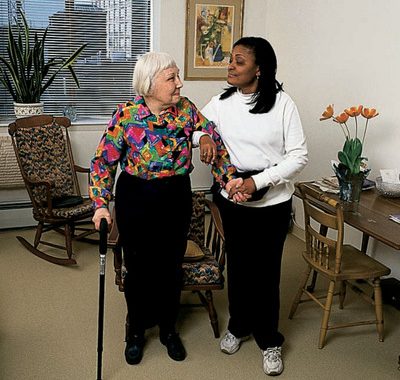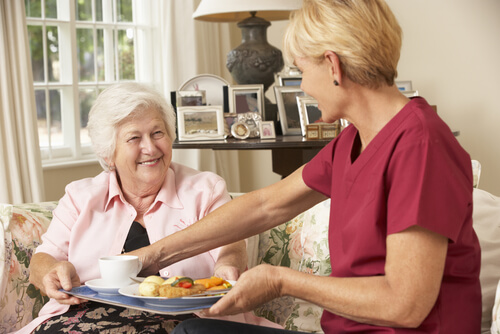
Start Caring for a Family Member at Home
Not unlike the feeling that new parents experience, families faced with the sudden need to care for a senior parent or relative usually feel scared and overwhelmed.
How to cope with the new care challenges, as well as the simple addition of so many daily tasks to an already busy workload, leave some difficult questions to answer.
What type of care tasks can I provide?
What do I need to learn about elder care and medication before I begin?
Could home care damage a cherished family relationship?
Will I be able to face the more personal and intimate requirements of care?
These questions and many more arise when such a seismic and, usually, an unexpected duty of care enters our lives.
Early Advice for Anyone Caring for a Senior Parent
Home care is a challenging job in its own right. That challenge increases exponentially when the dependent is one’s own mother, father, or another relative.
The potential for strained relationships and disagreements, added to the increased burden of everyday tasks and chores, mean some big decisions regarding how you’ll care for your elderly parent and what support you’ll need.
Today, we’ll look at some of the factors you’ll need to consider as you begin to take on the task of providing care and comfort for a senior family member.
Practical Tasks
The first thing to do is sit down with your senior family member – or even someone who understands their daily routine – to draw up a complete list of tasks that absolutely must get done every day, week, and month. These could include a wide range of activities, so start with an open mind and give the task plenty of time.
Think about physical activities where the person might need help, like dressing in the morning, getting up and around the house, heading out of the house for a morning walk, and any other common morning task. This will set you off thinking about the daily routine and help you both walk through a typical day. In each scenario, consider whether your loved one’s condition will limit them from getting through the activity and how you can help make it easier, preferably without intruding or taking it over completely.
Regular chores like cleaning, weekly trips to the grocery store, walking the dog, and bringing in the mail will provide another example of areas you can help. Admin tasks such as making sure bills get paid and services are arranged also need to be considered, as seniors often rely on these services and won’t be able to cope without them.
Keep in mind that this is not a list of everything you will do, but merely a starting point to separate out the most vital tasks from those that are less important, or which your loved one should still be able to accomplish. You can also divide the responsibilities among family, friends, and professional service providers in some cases, making the burden less difficult to bear for the primary caregiver.
Consider Communication
As the offers of help increase from family and friends, it’s often the case that the voice of your senior family member can become drowned out. Don’t allow this to happen. The sense of isolation and losing control will be considerably worse than any element of care that may be overlooked for a moment.
Firstly, make sure that the discussions about care and what’s required include your loved one, wherever possible. Their wishes should be considered in every case, even when a decision has to be made that they might not like. Even having some input is better than feeling that family members are taking everything away from them, as it offers some sense of control and influence. As much as their condition makes it possible, allow them that input.
Sometimes the very act of having a conversation about care can be therapeutic. The shift to full-time care can be particularly difficult, so take it one step at a time and be openly communicative with your senior family member at every possible stage.
Professional Assistance
There are various levels of support you can receive in caregiving, from a few tasks being taken care of on your behalf to a complete home care solution.
From your task list created in the earlier section, start with the tasks that you know will be toughest to achieve based on your skills and schedule, then make sure you seek out qualified help to get them done. This could be anything from getting evening meals delivered because you can’t get out of work quickly enough to cook, to having an care provider check in during the early morning when you can’t be around to set up the day.
A professional home care provider will cover all kinds of services. The kind of service – whether agency or individual, medical professional or home health assistant – will depend entirely on the requirements of your senior family member and the availability of secondary caregivers in the form of other friends and family. You might only need a few hours help a week at first, but that requirement could grow and already having a caregiver on hand whom you trust will make the transition that much easier.
Even with the many treatments and care options available, the most important thing to remember about caring for a parent into their senior years is communication.
Professional caregiver Nancy L. Kriseman has the following words of wisdom:
“Embracing a healing presence requires you to just be in the moment together.”
As you take on a new set of care duties, it’s important to keep in mind that this person is family first, patient or dependent second. Talk to them as you always have, play games, read, laugh and cry with him or her. Enjoy all the regular activities you have throughout their life, as much as their condition allows it.
Old age raises all kinds of health problems and challenges, but they need not remove the fullness of life from the things you love to do with your senior.
As our family members age, that all-important quality of life is increasingly based on the care you can provide – personally or with the help of a professional – and the experiences you help them have.
We know you will give everything to the care of your senior family member, but make sure that in doing so you don’t overlook the importance of celebrating the life and memorable moments you have experienced together.






